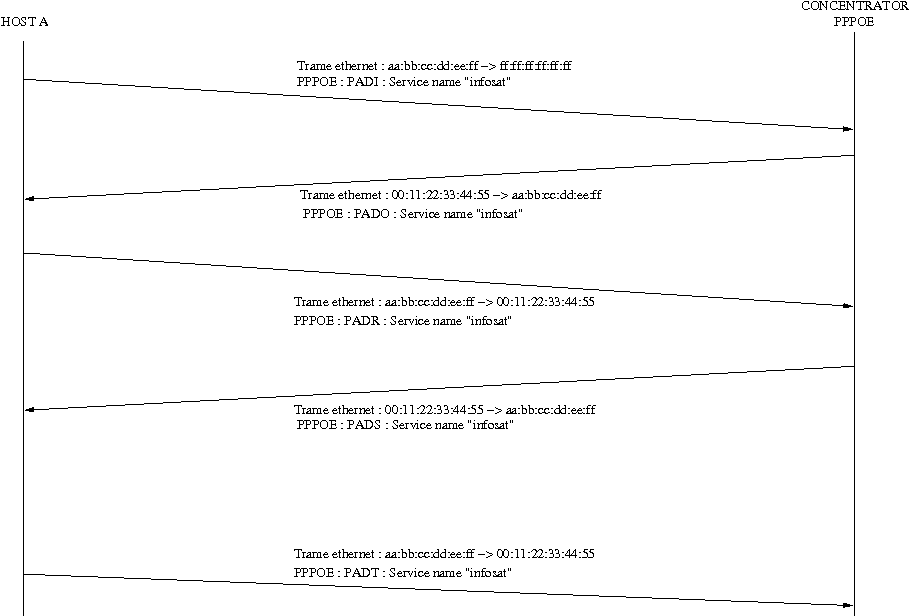Le “handshake” PPPoE fonctionne enfin… M’enfin il reste des choses à faire tout de même!!!
Pour rappel :

La structure d’un trame ethernet est :
1 0 1 2 3 4 5 6 7 8 9 0 1 2 3 4 5 +-+-+-+-+-+-+-+-+-+-+-+-+-+-+-+-+ | DESTINATION_ADDR | | (6 octets) | | | +-+-+-+-+-+-+-+-+-+-+-+-+-+-+-+-+ | SOURCE_ADDR | | (6 octets) | | | +-+-+-+-+-+-+-+-+-+-+-+-+-+-+-+-+ | ETHER_TYPE (2 octets) | +-+-+-+-+-+-+-+-+-+-+-+-+-+-+-+-+ ~ ~ ~ payload ~ ~ ~ +-+-+-+-+-+-+-+-+-+-+-+-+-+-+-+-+ | CHECKSUM | +-+-+-+-+-+-+-+-+-+-+-+-+-+-+-+-+
On détermine une trame PPPoE d’après le type de la trame: 0x8863 (Découverte PPPoE) et 0x8864 (Etablissement PPP). Et la dans le payload d’une trame ethernet, on se retrouve avec la structure PPPoE du type :
1 2 3 0 1 2 3 4 5 6 7 8 9 0 1 2 3 4 5 6 7 8 9 0 1 2 3 4 5 6 7 8 9 0 1 +-+-+-+-+-+-+-+-+-+-+-+-+-+-+-+-+-+-+-+-+-+-+-+-+-+-+-+-+-+-+-+-+ | VER | TYPE | CODE | SESSION_ID | +-+-+-+-+-+-+-+-+-+-+-+-+-+-+-+-+-+-+-+-+-+-+-+-+-+-+-+-+-+-+-+-+ | LENGTH | payload ~ +-+-+-+-+-+-+-+-+-+-+-+-+-+-+-+-+-+-+-+-+-+-+-+-+-+
Bref, cela commence à sentir bon le PPP tout court 🙂 :
14:16:24.474241 PPPoE PADI [Service-Name] [Host-Uniq UTF8] [Relay-Session-ID UTF8] 14:16:24.474378 PPPoE PADO [AC-Name "flex"] [Service-Name "infosat"][AC-Cookie UTF8] [Relay-Session-ID UTF8] [Host-Uniq UTF8] 14:16:24.480894 PPPoE PADR [Service-Name "infosat"] [Host-Uniq UTF8][Relay-Session-ID UTF8] [AC-Cookie UTF8] 14:16:24.481448 PPPoE PADS [ses 0x15] [Service-Name "infosat"][Relay-Session-ID UTF8] [Host-Uniq UTF8]
Update : Mon Sep 24 17:42:39 CEST 2007:
Code du patch : patch-arpnat-ebtables-V0.3-debug
Pour informations les gens, le SLOB (algorythme d’allocation des pages physiques) ne fonctionne pas de manière géniale sur l’ADM5120 !
PPPoE